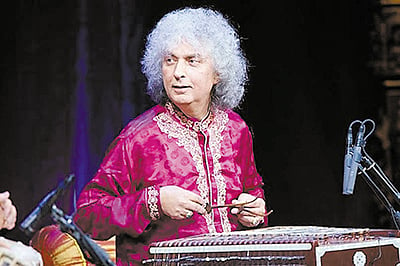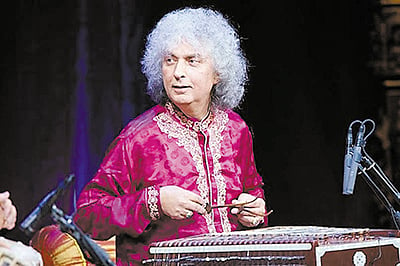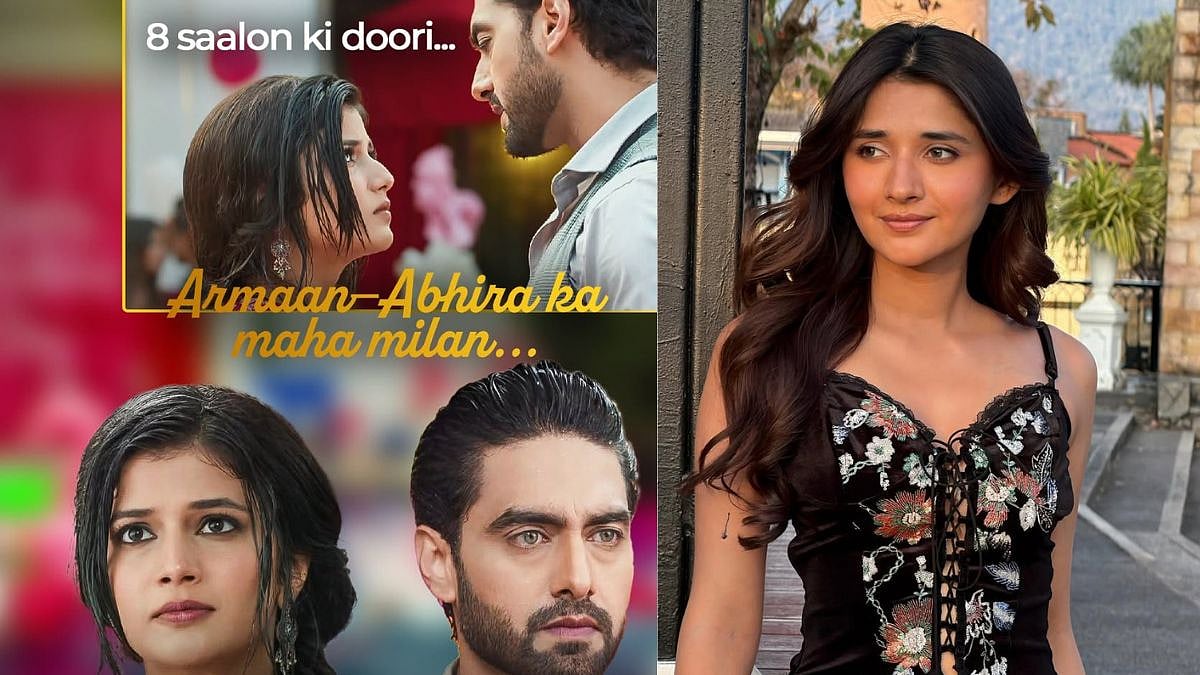The book takes the reader on a journey that goes back to a time when the maestro first started out as an adolescent learning the rudiments of Indian classical music under the guidance of his guru and father, Uma Dutt Sharma.
To say that this is a Coffee Table book is to deny it its due. For it is more than a pictorial presentation of the life and times of one of the truly musical aficionados of our times, Shiv Kurmar Sharma has done to music what few – or hardly anyone else – has done and that is to present a new musical instrument, the santoor, to the world of arts.
Until about sixty or seventy years ago the santoor was hardly known to anyone connected with Indian classical music even though musicologists trace its origins to centuries ago when a string instrument called Shata-tantri veena or veena with a hundred strings was in existence. But why playing the santoor was limited almost totally to Kashmir has always remained a mystery. And that, too, was played only as an accompaniment to Sufi music.

We learn that instruments similar to the santoor have been found in different parts of the world under differ¬ent names. No matter. In India, it was limited to Kapltmir. And how it came to be popular and accepted in musical circles throughout the length and the breadth of India is what makes this book especially relevant. Shiv Kumar is the son and disciple of the late Pandit Uma Dutt Sharma who belonged to a family of priests but later turned into a musician. He lived in Jammu and was known as an accomplished tabla, harmonium and esraj player. And in the early fifties he was in charge of the music section of Radio Srinagar. It was then that he did extensive research on the santoor and started teaching his son the intricacies of the instrument. That was the beginning, so-to-speak of the santoor revolution.
With a musician father, Shiv Kumar took to music at a very young age. He was hardly five when he began to take lessons, first in vocal music and then in tabla. Santoor came into his life later.
What is interesting about Shiv Kumar is not only that he was learning music but he didn’t neglect academics and studied for a Masters degree in Economics from the Jammu & Kashmir University.
But as his Vijay Kichlu puts it: “Given the kind of intellectual and spiritual background he came from, it is not surprising that he finally decided to accept the challenge of playing santoor as his main instrument. To him goes the credit of converting the santoor to one of the major instruments of Indian classical music.”
That is not only high praise but accepting the fact of santoor’s relevance in the practice o f music. And this was conceded by no less a great musician as Vilayat Khan who, at a public performance in the presence of several musicians said: “There is no doubt that we have earned a great name for ourselves, but we have to accept that we all have the support of our ancestors who passed on the knowledge to us, but Shivji established an instrument like the santoor in the world of classical music entirely on his own.” In a way Shiv Kumar was to the end loyal to his father who had told him: “I want you to make the santoor your instrument and career.” Kichlu adds: “It seems that he had a premonition about the deep relationship between Shivji and the santoor and his son lived up to his adesh (instructions) by accepting the challenge. Thus destiny gave us a legend in the true sense.”
Santoor may not necessarily be one of the more popular musical instruments, but Shiv Kumar has had his disciples and quite a few of them have made a name for themselves and are performing domestically and internationally. But to know more about the heights of glory reached by Shiv Kumar one must read Manek Premchand’s fascinating chapter which reminds us of the role played by the santoor genius in the world of film. Manek reminds us that Shiv Kumar was playing the table both on the stage and on radio when he was barely eight years old. But it was when first he played on the santoor at a famous Swami Haridas Festival in Mumbai in February 1955 that he made his mark to the point that the great V. Shantaram wanted him to work for Prabhat Talkies.
Composer Vasant Desai suggested to the young Shiv Kumar if he could compose and play the santoor for a scene in the lake during which Gopi Krishna and Sandhya are romancing in a boat. That’s when the santoor and the man behind it, says Manek, made their first appearance in Hindi cinema. It made history. And to think that Shiv Kumar then was hardly eighteen years old.
But the young player took his own time to come to Mumbai and he was very selective. Manek traces Shiv Kumar’s career in the film world in great detail. He was very much in demand when he played the santoor for such classic singers as Lata Mangeshkar, Lata and Kishore, Lata and Mukesh, Kishore, Rafi, Asha and Rafi and others – in all in some 53 cases. Shiv Kumar had even Amitabh Bachchan sing for him. Manek quotes Amitabh Bachchan as saying of one particular occasion: “It was an unforgettable jugalbandhi that happened impromptu that evening. It was spontaneous music composed unrehearsed, with Shivji, Hariji and Zakir Bhai. I don’t know what it was and I have never heard Shivji play the santoor so beautifully. This went on for hours, well past midnight and when it was all over, we could see not just a physical exhaustion on the part of Shivji, but as though his very soul had been spent. It was pure magic…”
According to Manek, Shiv Kumar is intensely human and though fully conscious of his talent was one who would never try to outdo anyone he was playing with. As he too says: “Shivji is as keen a listener in human affairs, as he is an interesting speaker. You can see his prey-blue eyes focussing all the time, and then when he speaks, he speaks with art and wisdom. Exactly the same way as when HIS santoor speaks, the world listens.”
TRIBUTE
M.V. Kamath – God’s good man
I had the privilege of escorting M.V. Kamath from The Times of India office to Somaiya College of Arts and Commerce at Vidya Vihar. He was then the editor of the Illustrated Weekly of India. The drive was long but a revealing experience for Kamath spoke more about himself, how he became a reporter and a journalist.
As the Director of Somaiya Institute of Journalism and Mass Communication I had the pleasure of inviting him on several occasions. I always found him interesting. His knowledge of literature was amazing like his understanding of social problems in India.Much water has flown under the bridge, but M.V. Kamath is the same cordial human being. I met him last time before he left for Manipal with my friend Milind Gawai, a young reporter. He offered us tea and invited us to Manipal as a visiting lecturer. We had a long memorable conversation.
When I approached him to write a preface to my collection of poems “Due and the Grass and other poems” he consented and wrote a commendable preface.
M. V. Kamath will remain in my memory as a God’s good man.
-V Rajaraman
Remembering M.V. Kamath…
To begin on a personal note I have been following M.V. Kamath since I was 15 years young, that is, for over 62 years! Kamath was then the representative of the Times of India in Washington and his dispatches were marked by originality, topicality and presented a wealth of details on the subject he covered. I had occasion to address a meeting, along with him in Vile Parle and Kamath was overjoyed that he had an avid reader and admirer of his of fifty five years standing!. During this long period M.V Kamath has penned more than forty books and also his autobiography. He was appointed Chairman of Prasar Bharati by the BJP government.
In his 45-year journalistic career, he served as special commentator at Mumbai, New Delhi, Paris, Geneva, New York, Washington and UNO and has met several world leaders, all the doyens of the Freedom Movement as well as contemporary leaders of every hue. From 1978-81 he was the Editor of the ’Illustrated Weekly’. At 93, he continued to be a highly respected columnist writing with authority on political and social matters. He was the regular and highly esteemed book reviewer for this paper. I have learnt a lot from him in the art and science of book reviewing. -P.P. Ramachandran
LATE M. V. Kamath




